| Article ID | Journal | Published Year | Pages | File Type |
|---|---|---|---|---|
| 7338825 | Social Science Research | 2018 | 39 Pages |
Abstract
We extend research on the effects of religious ecologies by examining the role of religious ecologies in intergenerational socioeconomic mobility. We do so first by providing a theoretical framework addressing the diverse cultural influences of religious traditions and their impact on intergenerational mobility. We argue that certain otherworldly orientations among conservative Protestants suppress mechanisms of upward mobility, and that there are meaningful distinctions between sub-groups of conservative Protestants (evangelicals, fundamentalists, and Pentecostals). An analysis of county-level data from the recently released Equality of Opportunity Project and the Churches and Church Membership Survey is used to empirically examine the relationship between religious ecologies and intergenerational mobility. Findings suggest distinct effects of different religious groups on intergenerational mobility. These results demonstrate the importance of accounting for the ecological impact of religion on social mobility in the United States and challenge the conceptualization of conservative Protestants as a monolithic group.
Related Topics
Social Sciences and Humanities
Psychology
Social Psychology
Authors
Joseph Clark, Samuel Stroope,
